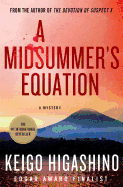
At the start of Keigo Higashino's A Midsummer's Equation, a boy on a train on his way to visit family meets physicist Manuba Yukawa, also known as Detective Galileo in the popular and Edgar-nominated Japanese mystery series. The boy's aunt and uncle run the Green Rock Inn in Hari Cove, a beach resort town that's fallen on hard times, and Yukawa is headed there to speak at a conference regarding a proposed underwater mining operation opposed by a local preservation group.
Yukawa decides to stay at the Green Rock Inn, and the night after he arrives, one of the guests is found dead on the rocks near the beach. The local cops think it an accident, but when the deceased turns out to be a former Tokyo homicide detective, the death looks more like murder. With Yukawa's help, the police discover that the detective's death might have ties to an old case that was closed due to a confession, but perhaps the resolution wasn't the truth.
As with Higashino's previous U.S. release, Malice, A Midsummer's Equation unfolds one layer at a time, each deepening the mystery, taking it in a different direction and ending up in unexpected places. Yukawa employs a low-key approach to solving the case, guiding the police to where they should look for clues instead of lording his intelligence over them the way Sherlock Holmes might with Inspector Lestrade. This teach-them-how-to-fish method encourages readers to examine the puzzle pieces and reach their own conclusions, maybe even have their own eureka moments. --Elyse Dinh-McCrillis, blogger at Pop Culture Nerd

